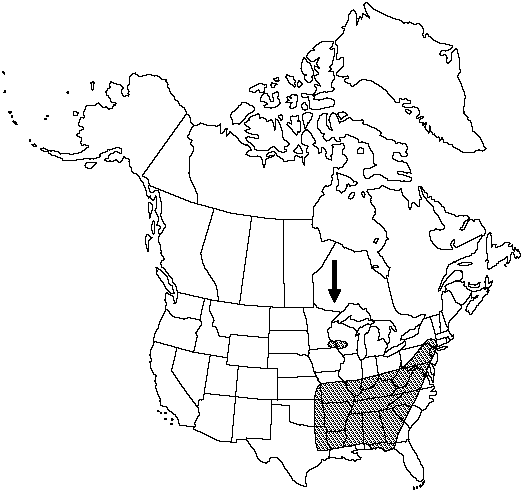Difference between revisions of "Cheilanthes lanosa"
in Emory,Rep. U.S. Mex. Bound. 2(1): 234. 1859.
FNA>Volume Importer |
FNA>Volume Importer |
||
| Line 23: | Line 23: | ||
}}<!-- | }}<!-- | ||
| − | --><span class="statement" id="st- | + | --><span class="statement" id="st-undefined" data-properties=""><b>Stems </b>compact to short-creeping, usually 4–8 mm diam.; scales often uniformly brown but at least some on each plant with thin, poorly defined, dark, central stripe, linear-lanceolate, straight to slightly contorted, loosely appressed, persistent. <b>Leaves</b> clustered, 7–50 cm; vernation circinate. <b>Petiole</b> dark brown, rounded adaxially. <b>Blade</b> linear-oblong to lanceolate, usually 2-pinnate-pinnatifid at base, 1.5–5 cm wide; rachis rounded adaxially, lacking scales, with monomorphic pubescence. <b>Pinnae</b> not articulate, dark color of stalk continuing into pinna base, basal pair slightly smaller than adjacent pair, ± equilateral, appearing sparsely hirsute adaxially. <b>Costae</b> brown adaxially for most of length; abaxial scales absent. <b>Ultimate</b> segments oblong to lanceolate, not beadlike, the largest 3–5 mm, abaxially and adaxially sparsely hirsute with long, segmented hairs. <b>False</b> indusia marginal, weakly differentiated, 0.05–0.25 mm wide. <b>Sori</b> discontinuous, concentrated on small apical and lateral lobes. <b>Sporangia</b> containing 64 spores. <b>2n</b> = 60.</span><!-- |
-->{{Treatment/Body | -->{{Treatment/Body | ||
| + | |phenology=Sporulating summer–fall. | ||
|habitat=Rocky slopes and ledges, on a variety of substrates including limestone and granite | |habitat=Rocky slopes and ledges, on a variety of substrates including limestone and granite | ||
|elevation=100–800 m | |elevation=100–800 m | ||
| Line 45: | Line 46: | ||
|basionyms=Nephrodium lanosum | |basionyms=Nephrodium lanosum | ||
|family=Pteridaceae | |family=Pteridaceae | ||
| + | |phenology=Sporulating summer–fall. | ||
|habitat=Rocky slopes and ledges, on a variety of substrates including limestone and granite | |habitat=Rocky slopes and ledges, on a variety of substrates including limestone and granite | ||
|elevation=100–800 m | |elevation=100–800 m | ||
| Line 52: | Line 54: | ||
|publication year=1859 | |publication year=1859 | ||
|special status= | |special status= | ||
| − | |source xml=https://jpend@bitbucket.org/aafc-mbb/fna- | + | |source xml=https://jpend@bitbucket.org/aafc-mbb/fna-data-curation.git/src/9216fc802291cd3df363fd52122300479582ede7/coarse_grained_fna_xml/V2/V2_559.xml |
|genus=Cheilanthes | |genus=Cheilanthes | ||
|species=Cheilanthes lanosa | |species=Cheilanthes lanosa | ||
| − | |||
| − | |||
| − | |||
| − | |||
| − | |||
| − | |||
| − | |||
| − | |||
| − | |||
| − | |||
| − | |||
| − | |||
| − | |||
| − | |||
| − | |||
| − | |||
| − | |||
| − | |||
| − | |||
| − | |||
| − | |||
| − | |||
| − | |||
| − | |||
| − | |||
| − | |||
| − | |||
| − | |||
| − | |||
| − | |||
| − | |||
| − | |||
| − | |||
| − | |||
| − | |||
| − | |||
| − | |||
| − | |||
| − | |||
| − | |||
| − | |||
| − | |||
}}<!-- | }}<!-- | ||
-->[[Category:Treatment]][[Category:Cheilanthes]] | -->[[Category:Treatment]][[Category:Cheilanthes]] | ||
Revision as of 13:23, 27 July 2019
Stems compact to short-creeping, usually 4–8 mm diam.; scales often uniformly brown but at least some on each plant with thin, poorly defined, dark, central stripe, linear-lanceolate, straight to slightly contorted, loosely appressed, persistent. Leaves clustered, 7–50 cm; vernation circinate. Petiole dark brown, rounded adaxially. Blade linear-oblong to lanceolate, usually 2-pinnate-pinnatifid at base, 1.5–5 cm wide; rachis rounded adaxially, lacking scales, with monomorphic pubescence. Pinnae not articulate, dark color of stalk continuing into pinna base, basal pair slightly smaller than adjacent pair, ± equilateral, appearing sparsely hirsute adaxially. Costae brown adaxially for most of length; abaxial scales absent. Ultimate segments oblong to lanceolate, not beadlike, the largest 3–5 mm, abaxially and adaxially sparsely hirsute with long, segmented hairs. False indusia marginal, weakly differentiated, 0.05–0.25 mm wide. Sori discontinuous, concentrated on small apical and lateral lobes. Sporangia containing 64 spores. 2n = 60.
Phenology: Sporulating summer–fall.
Habitat: Rocky slopes and ledges, on a variety of substrates including limestone and granite
Elevation: 100–800 m
Distribution

Ala., Ark., Conn., Fla., Ga., Ill., Ind., Kans., Ky., La., Md., Minn., Miss., Mo., N.J., N.Y., N.C., Ohio, Okla., Pa., S.C., Tenn., Tex., Va., W.Va., Wis.
Discussion
Cheilanthes lanosa is apparently confined to the forests and prairies of eastern North America, and reports of this distinctive species from Arizona and New Mexico (A. J. Petrik-Ott 1979) have not been substantiated by herbarium specimens.
Selected References
None.